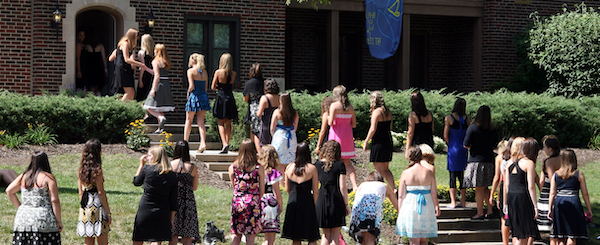Fraternities and sororities are held up by some as the epitome of the American college experience; by others, they are viewed as hotbeds for bullying and body issues. New polling by YouGov finds that one in three Americans attended a college with fraternities or sororities, and that opinions about their impact are divided. Majorities see them as positive for students' career opportunities and social skills, but many also identify the organizations with problems with excessive alcohol consumption and hazing.
Few Americans have personally been active participants in what is sometimes known as Greek Life: 7% of men and 6% of women say they have been members of a college fraternity or sorority, respectively. Both men and women rank friendship first among a list of 10 reasons for joining a fraternity (75%) or sorority (74%). The next two most common reasons cited by men who have been in fraternities are parties (47%) and campus involvement (47%). For women in sororities, the next two reasons are campus involvement (53%) and community service (35%).
Positives and negatives
Americans are divided as to the influence that fraternities and sororities have on campus culture, though very or somewhat negative views of fraternities' effects (38%) are more frequent than very or somewhat positive ones (21%); about one in three say the effect of each is neither positive nor negative. People who have been a member of a fraternity or sorority are far more likely to say their effects are positive than negative.
How do fraternities and sororities affect the lives of their members? Belonging to a college fraternity is more likely to be seen as having a very or somewhat positive than very or somewhat negative effect on a member's networking opportunities, career opportunities, social skills, dating life, community involvement, leadership skills, and sense of self-worth. More see negative than positive effects of fraternity membership on a student's morality, physical health, mental health, and academic performance.
All of the effects seen by Americans as more positive than negative for fraternity members are also seen that way about sororities. However, people are 4 percentage points more likely to say sorority rather than fraternity membership has a positive effect on students' community involvement. They also are 6 points less likely to say sororities have a negative effect on a student's morality, and the same is true for academic performance.
Exclusion
While many identify positive aspects of membership in sororities and fraternities, acceptance into such organizations isn't a given. Majorities of Americans believe that fraternities and sororities exclude potential members very or somewhat often based on candidates' popularity, physical appearance, and class background. Fewer — though still at least one in three – say religion and academic performance are used as bases for exclusion.
Although both fraternities and sororities are viewed by large shares as being exclusionary in some form or another, there are some minor differences in how each type of organization is evaluated. Americans are 5 points more likely to say that exclusion based on sexuality is very common in fraternities compared to sororities. They are 4 points more likely to say appearance-based exclusion happens very often in sororities relative to fraternities.
What about exclusion based on gender? Most are OK with it. Around two-thirds of Americans believe that single-sex fraternities (65%) and sororities (67%) should be allowed to remain that way, excluding members of the other gender.
Problems
When fraternities and sororities make headlines, it isn't always for positive reasons. At least two-thirds of Americans say each of excessive alcohol consumption, hazing, bullying, sexual assault, and drug use are at least somewhat of a problem in college fraternities.
While excessive alcohol consumption, hazing, and sexual assault also are seen by many as problems for sororities, fewer say they are very big problems than say so for fraternities. Many Americans see body image pressure as a problem in sororities – more than do so for fraternities.
Nearly half of people (46%) who were members of a fraternity or sorority say they experienced hazing, including 10% who say they experienced severe hazing. Even more — 57% — say they witnessed other people being hazed, and 12% say they saw severe hazing.
Among people who say they saw or witnessed hazing, they described experiences that fall into a few distinct categories. When asked to describe the hazing in their own words, some mention physical punishment, including doing push-ups or being beaten. Others cite experiences involving verbal abuse or humiliation, including body shaming or being made to wear embarrassing clothing. Being pressured or forced to ingest alcohol or other substances — such as a raw egg — was also mentioned by a number of respondents. Others described having to perform chores or being the recipient of harmless pranks.
The vast majority of Americans believe that if a college fraternity or sorority is caught hazing its members, it should be suspended from campus, either permanently (49%) or temporarily (32%). Older Americans are far more likely than younger adults to favor permanent suspension.
As many results from our poll have demonstrated, Americans have mixed views on the effects of college fraternities and sororities. This tension is also reflected in their willingness to allow a hypothetical child of theirs in college to join one. Slightly over one in three say they'd definitely or probably let a child of theirs in college join a fraternity (35%) or sorority (37%); similar shares say they would probably or definitely not let them join (40% and 38%, respectively). People who were members of a fraternity are far more enthusiastic: About three in four say they'd definitely or probably let their child join either type of organization.
See the results for this YouGov poll
Methodology: The poll was conducted among 2,000 U.S. adult citizens on two separate surveys from August 16 - 21, 2023 and August 17 - 20, 2023, with each survey taken by 1,000 U.S. adult citizens. Respondents were selected from YouGov’s opt-in panel using sample matching. A random sample (stratified by gender, age, race, education, geographic region, and voter registration) was selected from the 2019 American Community Survey. The sample was weighted according to gender, age, race, education, 2020 election turnout and presidential vote, baseline party identification, and current voter registration status. Demographic weighting targets come from the 2019 American Community Survey. Baseline party identification is the respondent’s most recent answer given prior to March 15, 2022, and is weighted to the estimated distribution at that time (33% Democratic, 28% Republican). The margin of error for the overall sample is approximately 3%.
Image: Wikipedia (Huw Williams, Huwmanbeing)











